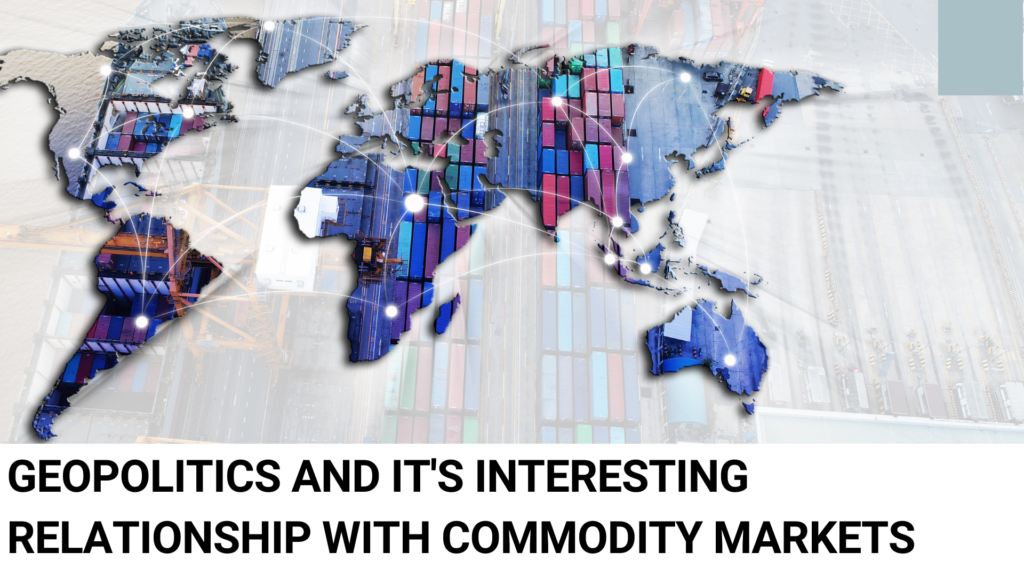
The Commodity Market is a unique entity and just like other markets, several outside factors affect the flow of the market. Geopolitical factors have a profound influence on commodity markets worldwide. The interplay between political dynamics and economic forces can significantly impact commodity prices, supply chains, and market dynamics.
This is a phenomenon that has been in existence for a long time but has been discussed quite less. Join us today as we embark on a journey to understand the commodity market and its uncanny relationship with Geopolitics.
So without further adieu, let’s begin!!
Supply Disruptions:
The first one on the list is supply disruptions and here’s why they affect the market.
Geopolitical tensions and conflicts in major commodity-producing regions have the potential to disrupt the supply of essential commodities. Instances of political instability or armed conflicts in oil-producing countries, for example, can lead to supply disruptions and subsequent price hikes. Furthermore, trade disputes or sanctions imposed on commodity-exporting nations can restrict their exports, resulting in global supply constraints and volatile prices. The recent issues relating to supply cuts by OPEC can be one of the finer examples of this phenomenon.
Trade Policies and Tariffs:
People with intricate knowledge of international laws and trade policies might know that trade policies and tariffs profoundly affect the market. Every day news reports suggest clues to these factors.
Geopolitical considerations play a pivotal role in shaping trade policies and imposing tariffs, directly influencing commodity markets. The imposition of trade barriers, such as tariffs or quotas, can impede the flow of commodities between countries, consequently affecting supply and demand dynamics. Trade disputes between major economies can trigger retaliatory measures, exacerbating disruptions in commodity trade. May it be oil, manufacturing substances or any kind of commodity, the same story repeats itself once in a while.
Energy Security:
Energy is one of the leading factors in the global commodity market and its reliance on it is something we cannot deny.
Geopolitical factors often shape energy policies and strategies, which have significant implications for commodity markets. Countries may prioritize energy source diversification to reduce dependence on politically unstable regions. Shifts in energy policies, such as the promotion of renewable energy or nuclear power, can impact the demand for commodities like coal, oil, and gas, consequently altering market dynamics.
Currency Movements:
Geopolitical events have the potential to cause significant fluctuations in currency values, which directly impact commodity prices. As commodities are typically priced in US dollars, currency devaluations or appreciations can lead to price fluctuations. Changes in exchange rates can influence the cost of production, transportation, and international trade, thereby affecting commodity prices.
Investment Flows:
Geopolitical stability or instability plays a critical role in shaping investor sentiment and capital flows, including investments in commodity markets. Uncertain geopolitical environments can heighten risk perception among investors, influencing commodity prices. Moreover, geopolitical events can trigger shifts in investment portfolios, leading to capital flows into or out of commodity markets.
Regulatory Changes:
Geopolitical factors can drive regulatory changes in commodity markets. Governments may introduce new regulations or alter existing policies related to environmental standards, labour practices, or resource nationalization. These regulatory shifts can have a profound impact on commodity production, supply chains, and market dynamics. The adoption of new technology or new materials could also be a big factor in the commodity market changes.
Final Note:
Geopolitics and commodity markets are intertwined in a complex web of interactions. The impact of geopolitical factors on commodity prices and market dynamics cannot be understated. From supply disruptions and trade policies to energy security and currency movements, geopolitical considerations have far-reaching consequences on commodity markets worldwide. Investors, market participants, and policymakers closely monitor geopolitical developments to gauge potential risks and opportunities in commodity markets. Understanding the intricate relationship between geopolitics and commodities is crucial for navigating the complexities of today’s global economy.
We hope that blog was helpful. We’ll be back with more info soon, so until next time see ya!!
References:
https://www.lawcareers.net/Explore/CommercialQuestion/White-Case-LLP-Geopolitical-impacts-on-commodity-trading
https://www.sciencedirect.com/science/article/abs/pii/S1544612322002999